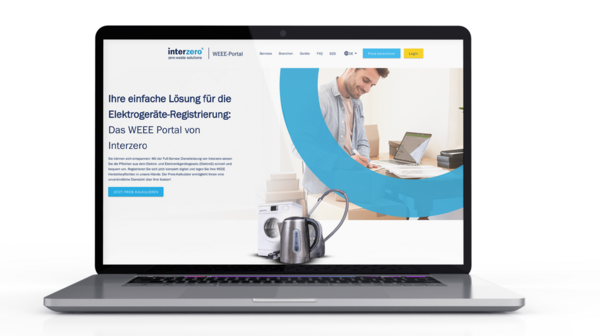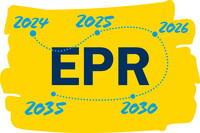EPR requirements for manufacturers and distributors
Since 2005, Interzero has helped makers and distributors of electrical and electronic equipment in Germany comply with extended producer responsibility (EPR) pursuant to the German Electrical and Electronic Equipment Act (ElektroG). This responsibility extends to the environmentally friendly disposal and recycling of electrical and electronic equipment – all of which have been part of the service portfolio from Interzero EPR Services GmbH since December 2022.
After entering into force in 2005, several amendments to the ElektroG over the last couple of years have updated this legislation and imposed new requirements on manufacturers. Why? Because the 65 percent collection rate set by the EU for waste electrical and electronic equipment has never been met. In 2021, the figure for Germany was just 38.6 percent. By setting out targeted provisions for manufacturers and distributors, the ElektroG aims to improve this rate.
How does it work?
Legal requirements for manufacturers and distributors vary according to the target market (end consumers or businesses), sales channel (online or brick-and-mortar) and the origin of the manufacturer (Germany or abroad).
An example:
Let’s imagine that Peter runs a business that makes fridges. He wants to sell these refrigerators to consumers. So he needs to meet certain requirements, as follows.
1. Registration:
Peter must register his fridges with the foundation Elektro-Altgeräte Register (EAR). EAR manages a public register for manufacturers and enforces compliance with the extended producer responsibility (EPR) for electrical appliances.
2. Regular reports:
Every month, Peter must report the number of refrigerators he has sold. This figure helps to track the whereabouts of the appliances.
3. Commissioning a service provider:
To dispose of old fridges from private households, Peter needs to commission a service provider to pick them up and deliver them to a recycling depot. In theory, Peter is free to organise this himself. However, because the pick-up from a specified location in Germany needs to be completed within a specified time of 48 h or less, the vast majority of companies end up using a service provider instead.
4. Insolvency-proof guarantee:
Peter must provide an insolvency-proof guarantee to ensure that the disposal of used electrical items is properly handled even if his company runs into financial difficulties or a product category is discontinued.
If Peter was a manufacturer based outside Germany, he would not be able to register his fridges with the foundation EAR himself. Instead, he would need to appoint an authorised representative in Germany who could then complete this registration on his behalf.
So Peter needs to deal with quite a bit of red tape before he can actually start selling his refrigerators. As this all takes time and resources, it would make sense for him to outsource these activities – to the twelve-member team at Interzero EPR Services, for example.
The team can handle all of the steps necessary to ensure the sale of the appliances in Germany, including pick-up and delivery to recycling depots. The service is managed using the digital WEEE Portal, which was launched in April 2023.
Peter’s company is just one example. Companies that sell appliances to the B2B market need to comply with many other rules – as do retailers, whether online or brick-and-mortar. Interzero’s EPR Services can also help out here. And it’s well worth it – with over 1,200 customers and 10,000 tonnes of electric waste per year.
Shared strategies and partnerships at Interzero
One challenging aspect of the ElektroG is its 1:1/0:1 take-back obligation for electronics products. Resellers with certain sales/storage capacities are affected, whether or not they are brick-and-mortar or online. Let’s look again at our example. If Peter doesn’t sell his fridges in a store but actually operates his own online shop, more regulations will then apply to his business. This is because he is now a distributor as well as a manufacturer. Once his storage and sales space reaches 400 sqm or more, he has to take back customer appliances according to the 1:1/0:1 principle. From take-back on delivery (for large household appliances and screens) to take-back services ‘at a reasonable distance’ for smaller appliances, we offer cost-effective solutions for both scenarios, which include the pick-up of appliances at private households by our reverse logistics team from Interzero Deposit Solutions.
More info on our website





![[Translate to English - Englisch:] [Translate to English - Englisch:]](/fileadmin/_processed_/1/4/csm_230606-AGA-Tridi-Indonesia-PET-recycling_e3dcd2ad90.jpg)